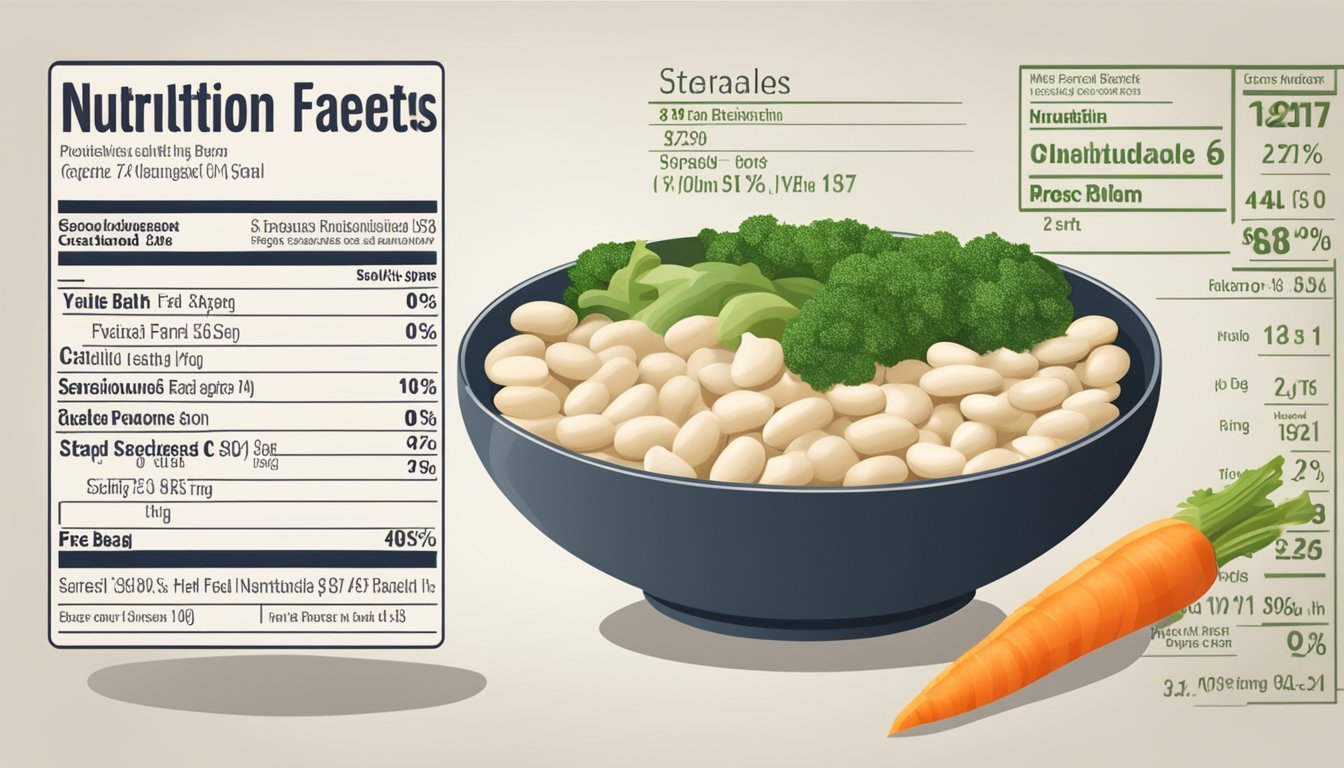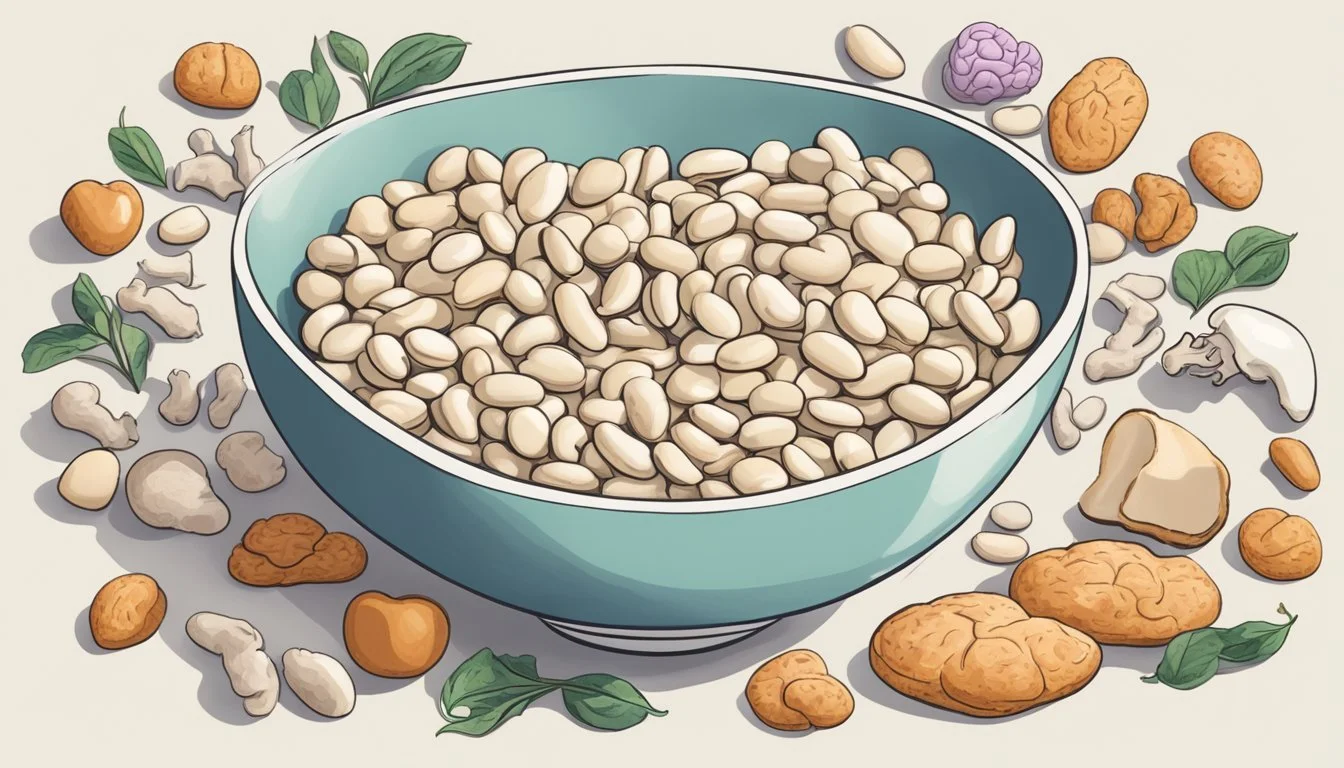What Are the Health Benefits of White Beans?
An Essential Nutrient Guide
White beans, often referred to as a nutritional powerhouse, offer a multitude of health benefits that cater to a well-rounded diet. High in fiber and protein, they are a splendid choice for individuals seeking to improve their nutritional intake. Aiding in the maintenance and repair of the body's tissues, white beans are an excellent source of plant-based protein which is especially beneficial for vegetarians and vegans looking for alternative protein sources.
In terms of micronutrients, white beans are abundant in folate, magnesium, potassium, calcium, and iron. The presence of these nutrients supports various bodily functions, including bone health, cardiovascular health, and the prevention of anemia. Consuming white beans can contribute to the overall mineral and vitamin requirements of an individual's daily diet. Moreover, their high fiber content can promote satiety, aiding in weight management by keeping one fuller for longer periods.
Health benefits associated with white beans extend to their potential in stabilizing blood sugar levels due to their low glycemic index. This makes them a suitable food choice for individuals managing diabetes. Additionally, the fiber found in white beans also supports digestive health, and its prebiotic nature can help in fostering a healthy gut flora, further enhancing digestive wellness.
Nutritional Profile of White Beans
White beans, known for their fiber and protein content, also provide an impressive array of vitamins and minerals. These nutrients make them an excellent component in a healthful diet.
Macronutrients and Calories
Calories: Approximately 139 calories per 100 grams.
Protein: Notably high, around 9.73 grams per 100 grams.
Fiber: Abundant, contributing to satiety and digestive health, with 6 grams per 100 gram serving.
Fats: Low in fat, making them a heart-healthy choice.
Carbohydrates: Present in moderate amounts, about 18.79 grams per 100 grams.
Vitamins and Minerals
Iron: A rich source with about 4 mg per 100 grams.
Calcium: Offers bone health support with roughly 80 mg per 100 gram serving.
Potassium: Essential for heart function, present at 561 mg per 100 grams.
Magnesium: Involved in numerous biochemical reactions, with 86 mg per 100 grams.
Zinc, Copper, Phosphorus, and Selenium: These trace minerals are found in varying but nutritionally significant amounts.
Vitamins: Especially high in folate (256 μg per 100 grams), also contributing B-vitamins essential for metabolic health.
Health Benefits of White Beans
White beans offer a variety of health benefits, particularly in supporting cardiovascular health, enhancing digestive wellness, controlling blood sugar levels, and aiding weight management efforts due to their nutrient-dense profile.
Supporting Heart Health
White beans are rich in fiber and folate, both of which are essential for heart health. Fiber helps to reduce bad LDL cholesterol, which is a risk factor for heart disease, while folate may lower homocysteine levels, potentially reducing the risk of heart complications. White beans also contain antioxidants that can mitigate oxidative stress, another contributor to heart disease.
Aiding Digestive Health
The high fiber content in white beans not only benefits the heart but is also crucial for digestive health. Fiber aids in maintaining a healthy digestive tract and can help to prevent common issues such as constipation. The inclusion of white beans in one's diet may contribute to a more robust and well-functioning digestive system.
Regulating Blood Sugar
For individuals managing diabetes or concerned about blood sugar levels, white beans are an excellent dietary choice. Their fiber content can help to slow the absorption of sugar into the bloodstream, which assists in regulating blood sugar levels and preventing spikes that can occur after meals.
Contributing to Weight Management
White beans can play a role in weight management due to their ability to promote a sense of fullness after consumption. The combination of high protein and fiber can lead to reduced calorie intake by minimizing hunger levels, a beneficial factor for those concerned with obesity or looking to maintain a healthy weight.
Culinary Uses and Varieties
White beans offer a spectrum of textures and flavors, proving to be a dynamic ingredient in various cuisines. They excel in soups, salads, and as the base for dips like hummus.
Common Varieties of White Beans
Navy Beans: Also known as small white beans, navy beans are known for their small size and denser texture, which holds up well during cooking. They're a common choice for baked beans and soups.
Cannellini Beans: Larger than navy beans with a kidney shape, cannellini beans have a creamier texture and are often used in Italian dishes such as minestrone soup or paired with pasta.
Great Northern Beans: Similar to cannellini, Great Northern beans are medium-sized with a more grainy, nutty flavor, suitable for a variety of recipes requiring firmer beans that maintain their shape.
Pinto beans are not traditionally categorized as white beans but are sometimes used interchangeably due to their similar flavor profile after cooking.
Cooking Tips and Recipe Ideas
Soups: White beans act as excellent thickeners for soups. A classic navy bean soup incorporates these beans for a comforting and hearty dish.
Salads: For a refreshing option, combine cannellini beans with vinaigrette and fresh vegetables for a protein-rich salad.
Hummus: Replace traditional chickpeas with great northern beans for a unique twist on hummus—pair it with fresh vegetables or pita bread.
Cooking: To ensure optimal texture, simmer white beans over low to medium heat; aggressive boiling can cause the beans to split.
When preparing white beans in a recipe, it is essential to consider their unique characteristics to achieve the desired culinary outcome.
Considerations and Recommendations
When incorporating white beans into one's diet, it is important to consider their digestive effects as well as their compatibility with various dietary habits. White beans are a versatile source of plant-based protein and can offer myriad health benefits, yet they may require certain considerations for optimal digestive health and dietary integration.
Digestive Concerns and Remedies
White beans, like all legumes, contain oligosaccharides, which can cause gas and bloating in some individuals. To minimize these effects, one should:
Soak dried beans for several hours or overnight before cooking, as it helps to reduce oligosaccharides.
Rinse canned white beans thoroughly under cold water to remove excess sodium and any substances that may cause indigestion.
Gradually increase the intake of fibrous foods like white beans to allow the gut time to adjust.
Consider combining white beans with digestive spices such as cumin or fennel to enhance their digestibility.
How White Beans Fit into Different Diets
White beans are an excellent addition to vegetarian and vegan diets due to their high content of plant-based protein and essential amino acids. They are also beneficial in diets aimed at improving heart health due to their anti-inflammatory properties. Here is how they match with various diets:
Vegetarian/Vegan: As a rich source of protein, white beans can serve as a staple in these plant-focused diets, contributing to the necessary nutrient intake without relying on animal products.
Heart Health: Their fiber content supports healthy cholesterol levels, which is pivotal for maintaining good heart health.
Anti-Inflammatory Diets: White beans contain antioxidants that may contribute to reduced inflammation in the body.
For those with specific dietary restrictions or health conditions such as kidney issues, they should consult a healthcare provider, as white beans are a source of potassium and phosphorus, which may require monitoring in these situations.
Frequently Asked Questions
White beans are recognized for their numerous health benefits, including their contribution to weight loss and protein content. This section aims to clarify common inquiries related to the nutritional impact and consumption of white beans.
How can white beans contribute to weight loss?
White beans are an excellent source of dietary fiber which helps people feel fuller for longer periods, potentially leading to reduced calorie intake and weight loss. Their high protein content also contributes to satiety.
What are the potential side effects of consuming white beans?
Consuming white beans can sometimes lead to digestive discomfort such as gas or bloating due to their high fiber content. Properly preparing and cooking white beans can help mitigate these effects.
How much protein do white beans contain per 100g?
Per 100g, white beans contain approximately 9g of protein, making them a good plant-based protein source for vegetarians and vegans.
Can eating white beans benefit skin health?
White beans contain micronutrients like folate and magnesium, which play a role in healthy cell function, potentially benefiting skin health.
Is it healthy to include canned white beans in my diet?
Canned white beans can be a healthy addition to a diet due to their convenience and similar nutritional profile to dried beans, provided they are low in added salts and preservatives.
What makes white beans be considered a superfood?
White beans are referred to as a superfood due to their high content of fiber, protein, and essential nutrients such as potassium, calcium, folate, and iron, which collectively contribute to various health benefits.






